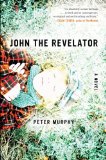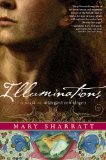Summary | Excerpt | Reading Guide | Reviews | Beyond the book | Read-Alikes | Genres & Themes | Author Bio

A Novel
by Peter MurphyPeter Murphy's debut, John the Revelator, is in many ways structured
like other well-known 20th-century Irish novels such as Paddy Clarke Ha Ha Ha by Roddy Doyle, and Butcher Boy by Patrick McCabe; it's
dark, gothic and gritty, has elements of both tragedy and black comedy, and is populated
with stock characters; but the author transcends the genre, taking these stereotypes and breathing new life into them. The resulting work is
utterly fresh, unique, and quite unlike anything else I've read.
Murphy's writing is difficult to categorize, primarily because he uses so
many different techniques throughout the novel. While much of the book is
straight-forward narration, he also inserts snappy dialog, dream sequences,
fables, Bible tales, and even stand-alone short stories penned by one of the
characters. Each part has its own flavor, its own style, proving him
to be an author of great versatility.
Underlying this variety is a base of simply beautiful writing. Murphy's
characterizations are rich, and his descriptions evocative:
The sky over Kilcody was deep red, big-bellied clouds moving across its expanse like herds of woolly mammoths. I hurried towards the village, powerless to stop what was happening. It was as though all the moments that made up our lives had been set in sequence like dominoes, a succession of trigger events, each precipitating the next, the number of our days preordained and planned since the beginning of time, and we were all no more than creatures made of billions of specks of dust sucked into the collapsing stars of our fates.
John the Revelator will likely be billed as a coming of age novel. The
protagonist does mature from child to adult through the course of the book, so
to some extent that designation is apt. Truly, though, the book is more a
snapshot of one pivotal year in the life of an adolescent boy, and, as in real
life, some experiences have meaning, some don't, some problems get resolved,
others are ongoing. This may frustrate readers who like neat, tidy plot lines
with definitive resolutions, as they won't find those elements cleanly
delineated, but it feels eminently appropriate in the context of this
novel.
Murphy packs many different characters and events into this short book, and
consequently it seems a bit too condensed; it would perhaps have benefited from
the inclusion of more exposition. From time-to-time, too, the scenes feel
disconnected from one another, episodic, almost as if the author had originally
penned parts of the novel as separate short stories. These flaws are minor,
though, and do little to detract from the book's overall quality.
John the Revelator will undoubtedly garner rave critical reviews, but the
reading public will likely have a wide range of opinions on whether or not it's
worth perusing. I can't even categorically state that this is one of those books
readers will either love or hate; Murphy's writing is so distinctive that reader
ratings will almost certainly run the full spectrum. The novel should appeal
most to those who revel in quality writing and enjoy books that break the mold.
About the Author
 Peter Murphy is a contributing editor with Hot Press
magazine and has written for Rolling Stone, the Sunday Business Post,
and others. Murphy has written liner notes (the writings found in booklet form
in many CDs) for albums and anthologies, including
the forthcoming re-mastered edition of the Anthology of American Folk Music,
which features the "Blind" Willie Johnson recording of the song John the
Revelator. He lives in the southeast of Ireland, in County Wexford, where he
grew up. John the Revelator was his first novel.
Peter Murphy is a contributing editor with Hot Press
magazine and has written for Rolling Stone, the Sunday Business Post,
and others. Murphy has written liner notes (the writings found in booklet form
in many CDs) for albums and anthologies, including
the forthcoming re-mastered edition of the Anthology of American Folk Music,
which features the "Blind" Willie Johnson recording of the song John the
Revelator. He lives in the southeast of Ireland, in County Wexford, where he
grew up. John the Revelator was his first novel.
Images: Above: Peter Murphy; Right: "Blind" Willie Johnson
![]() This review was originally published in The BookBrowse Review in September 2009, and has been updated for the
May 2010 edition.
Click here to go to this issue.
This review was originally published in The BookBrowse Review in September 2009, and has been updated for the
May 2010 edition.
Click here to go to this issue.

If you liked John the Revelator, try these:

by Mary Sharratt
Published 2013
Skillfully interweaving historical fact with psychological insight and vivid imagination, Sharratt's redemptive novel, Illuminations, brings to life one of the most extraordinary women of the Middle Ages: Hildegard von Bingen, Benedictine abbess, visionary, and polymath.

by Peter Bognanni
Published 2011
Wholly original, The House of Tomorrow is the story of a young man's self-discovery, a dying woman's last wish, and a band of misfits trying desperately to be heard.
Heaven has no rage like love to hatred turned, Nor hell a fury like a woman scorned.
Click Here to find out who said this, as well as discovering other famous literary quotes!
Your guide toexceptional books
BookBrowse seeks out and recommends the best in contemporary fiction and nonfiction—books that not only engage and entertain but also deepen our understanding of ourselves and the world around us.